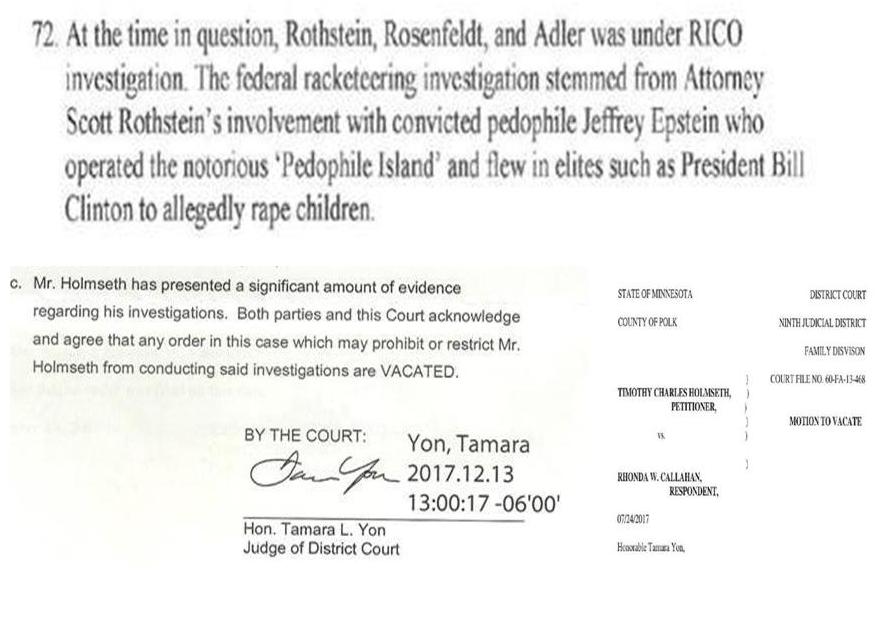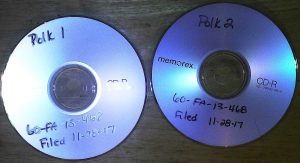Chief Judge Paul T. Benshoof
Are Minnesota court officers hiding evidence of child porn and fake adoptions by a fellow attorney?
Letter to Chief District Judge may bring answers
Chief Judge Paul T. Benshoof |
by Timothy Charles Holmseth on May 4, 2018 at 6:11 P.M. CST
On December 13, 2017, Honorable Tamara Yon, a judge in Polk County, Minnesota classified a series of audio recordings submitted to the court on CD’s as “evidence” in an Order.
The audio evidence is now public record.
 |
 |
The audio recordings capture a lawyer exploiting her status as an attorney while touting personal connections to police and CPS as she threatened and coerced a witness in a national profile kidnapping case into a situation that involved the young mother signing away the custody rights of her baby under threat of imprisonment.
The young mother targeted by the lawyer was not the lawyer’s client and was not asking the lawyer for advice or help.
The existence of the evidence, which also includes information about child pornography and fake adoptions, has created a very serious question. Have ANY of the judges, lawyers, or police that are documented as handling and/or using the evidence reported the content to the proper authorities?
It’s a critical question because Minnesota rules of judicial conduct have very defined codes regarding misconduct - and reporting the conduct of another attorney.
The following codes apply:
(B) A judge having knowledge that a lawyer has committed a violation of the Rules of Professional Conduct that raises a substantial question regarding the lawyer's honesty, trustworthiness, or fitness as a lawyer in other respects shall inform the appropriate authority.
(a) A lawyer who knows that another lawyer has committed a violation of the Rules of Professional Conduct that raises a substantial question as to that lawyer’s honesty, trustworthiness, or fitness as a lawyer in other respects, shall inform the appropriate professional authority. (b) A lawyer who knows that a judge has committed a violation of the applicable Code of Judicial Conduct that raises a substantial question as to the judge’s fitness for office shall inform the appropriate authority.
We may soon know.
Today, Timothy Charles Holmseth submitted a letter to Honorable Paul T. Benshoof, Chief Judge of Minnesota’s Ninth District that reads in part:
* * * * *
Honorable Benshoof:
I am contacting Your Honor because:
The situation involves an ongoing cover-up by a group of judicial officers in the Ninth Minnesota District that are acutely aware that a lawyer has allegedly possessed child pornography of a missing child, facilitated fake adoptions, conducted international baby sales, and coerced/threatened a young mother who was a kidnapping witness into surrendering the custody rights of her baby in a bid to obtain a false statement.
I have no evidence at this time that any judge or lawyer has reported the misconduct to the appropriate authority as required by applicable rules.
I am referring primarily to:
PROFESSIONAL RULES - CODE OF JUDICIAL CONDCUT - Rule 2.15 - Responding to Judicial and Lawyer Misconduct
MINNESOTA RULES OF PROFESSIONAL CONDUCT 8.3 REPORTING PROFESSIONAL MISCONDCUT and 8.4 MISCONDUCT
* * * * *
RULES CITED
Rule 2.15Responding to Judicial and Lawyer Misconduct
(A) A judge having knowledge that another judge has committed a violation of this Code that raises a substantial question regarding the judge's honesty, trustworthiness, or fitness as a judge in other respects shall inform the appropriate authority.
(B) A judge having knowledge that a lawyer has committed a violation of the Rules of Professional Conduct that raises a substantial question regarding the lawyer's honesty, trustworthiness, or fitness as a lawyer in other respects shall inform the appropriate authority.
(C) A judge who receives credible information indicating a substantial likelihood that another judge has committed a violation of this Code shall take appropriate action.
(D) A judge who receives credible information indicating a substantial likelihood that a lawyer has committed a violation of the Rules of Professional Conduct shall take appropriate action.
RULE 8.3: REPORTING PROFESSIONAL MISCONDUCT (a) A lawyer who knows that another lawyer has committed a violation of the Rules of Professional Conduct that raises a substantial question as to that lawyer’s honesty, trustworthiness, or fitness as a lawyer in other respects, shall inform the appropriate professional authority. (b) A lawyer who knows that a judge has committed a violation of the applicable Code of Judicial Conduct that raises a substantial question as to the judge’s fitness for office shall inform the appropriate authority.
RULE 8.4: MISCONDUCT It is professional misconduct for a lawyer to: (a) violate or attempt to violate the Rules of Professional Conduct, knowingly assist or induce another to do so, or do so through the acts of another; (b) commit a criminal act that reflects adversely on the lawyer’s honesty, trustworthiness, or fitness as a lawyer in other respects; (c) engage in conduct involving dishonesty, fraud, deceit, or misrepresentation; (d) engage in conduct that is prejudicial to the administration of justice; (e) state or imply an ability to influence improperly a government agency or official or to achieve results by means that violate the Rules of Professional Conduct or other law; (f) knowingly assist a judge or judicial officer in conduct that is a violation of applicable rules of judicial conduct or other law; (g) harass a person on the basis of sex, race, age, creed, religion, color, national origin, disability, sexual orientation, status with regard to public assistance, ethnicity, or marital status in connection with a lawyer’s professional activities; 117 (h) commit a discriminatory act prohibited by federal, state, or local statute or ordinance that reflects adversely on the lawyer’s fitness as a lawyer. Whether a discriminatory act reflects adversely on a lawyer’s fitness as a lawyer shall be determined after consideration of all the circumstances, including: (1) the seriousness of the act, (2) whether the lawyer knew that the act was prohibited by statute or ordinance, (3) whether the act was part of a pattern of prohibited conduct, and (4) whether the act was committed in connection with the lawyer’s professional activities; or (i) refuse to honor a final and binding fee arbitration award after agreeing to arbitrate a fee dispute.